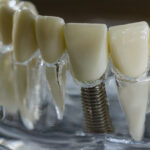While dental implants have revolutionized smile restoration, dental implant failure is a possibility, though uncommon. These failures typically occur within the first year of placement. These implants are sophisticated prosthetic tooth roots made from biocompatible materials, typically titanium, that are surgically placed into the jawbone. Once implanted, they fuse with the surrounding bone through a process called osseointegration, creating a stable foundation for attaching replacement teeth or dental bridges.
The importance of dental implants extends beyond cosmetic enhancement. They offer numerous benefits, including improved chewing efficiency, speech, and facial structure preservation. Unlike traditional dentures or bridges, implants provide a secure and permanent solution that doesn’t rely on adjacent teeth for support. Moreover, by mimicking natural tooth roots, implants stimulate the jawbone, preventing bone loss and maintaining overall oral health.
Types of Dental Implant Failures
Dental implant failures can be broadly categorized into two types: early implant failures and late implant failures.
Early implant failures occur prior to the completion of osseointegration, a crucial process where the dental implant integrates and fuses with the jawbone. These failures can result from factors such as inadequate initial stability of the implant, poor surgical technique, bone health, insufficient bone quality or quantity, infection, and patient-related factors like compromised healing abilities. However, your provider may recommend a sinus lift procedure on occasions when it is needed to help in bone volume and prevent early implant failures.
Late implant failures take place after osseointegration has successfully occurred. These failures might arise due to issues like peri-implantitis (an inflammatory condition affecting the tissues around the implant), biomechanical overload from poor occlusion or excessive forces, improper implant design or placement, as well as systemic factors like poor oral hygiene or systemic diseases interfering with healing. Understanding the causes behind these implant failures is essential for improving long-term success rates and ensuring effective patient care in dental implant procedures.
Causes of Dental Implant Failures
Dental implant failures can be attributed to a variety of factors that occur at different stages of the implant process. Understanding these causes and associated symptoms is crucial for both preventing potential complications and / or any implant problem.
Early Implant Failures
- Improper Implant Placement or Technique: Incorrect positioning of the implant during surgery can lead to insufficient stability and integration, increasing the risk of failure.
- Insufficient Bone Density or Volume: Inadequate bone support can hinder successful osseointegration and long-term implant stability.
- Infection or Peri-Implantitis: Bacterial infection around the implant site can cause inflammation, bone loss, and ultimately implant failure.
- Damage to Surrounding Structures: Nerve or blood vessel damage during surgery can result in persistent pain, compromised healing, and even implant failure.
- Allergic Reaction to Implant Material: In rare cases, an allergic response to the materials used in the implant can lead to inflammation and implant failure.
- Overloading of the Implant Too Soon: Applying excessive pressure on the implant before complete osseointegration can prevent proper healing and integration.
Late Implant Failures
- Poor Oral Hygiene Leading to Bacterial Infections: Neglecting oral hygiene can cause infections, leading to inflammation of the tissues around the implant.
- Excessive Pressure due to Teeth Grinding or Misaligned Bite: Continuous stress from grinding or a misaligned bite can lead to implant failure over time.
- Natural Bone Loss Over Time: Progressive bone loss can compromise the stability of the implant and its supporting structures.
- Implant Fracture: Fracture of the implant due to biomechanical overload or other factors can lead to failure.
- Gum Disease Affecting Surrounding Tissues: Gum disease can weaken the supporting tissues and bone, ultimately causing implant failure.
- Systemic Health Conditions: Systemic conditions like diabetes can impair the body’s ability to heal and integrate implants properly.
Symptoms Indicating Implant Failure
- Pain or Discomfort Around the Implant Site: Persistent pain may indicate underlying issues, such as infection or implant instability.
- Swelling or Inflammation: Inflammation of the gums around the implant can be a sign of infection or peri-implantitis.
- Difficulty Chewing or Biting: Problems with chewing or biting might indicate implant instability or misalignment.
- Implant Feels Loose: If the implant feels loose or moves, it suggests a lack of integration or mechanical failure.
- Visible Damage or Changes in Appearance: Visible signs of damage to the implant or surrounding tissues could indicate impending failure.
By recognizing these causes and symptoms, dental professionals can proactively address implant-related issues, ultimately enhancing the success and longevity of dental implant procedures. In some cases, an implant replacement may also be done if implant failure has been found. Fortunately, as of September 2021, the success rate of dental implant procedures reported success rates ranging from 95% to 98%, with failure rates at only 2%.
Treatments and Interventions
Preventive Measures
- Proper Oral Hygiene Practices: Thorough brushing, flossing, and using antimicrobial mouth rinses help maintain oral health, preventing bacterial buildup and potential infections around dental implants.
- Regular Dental Check-ups: Scheduled visits to the dentist allow for early detection of any issues, enabling timely intervention and preventing potential implant failures.
- Addressing Teeth Grinding or Bite Misalignment: Managing bruxism (teeth grinding) through night guards or orthodontic treatment ensures that excessive pressure is not placed on the implants, reducing the risk of failure.
Interventional Treatments for Early Failures
- Antibiotics for Infections: In case of infection, antibiotics may be prescribed to eliminate bacteria and prevent further complications around the implant site.
- Bone Grafting for Insufficient Bone Density: Bone grafting procedures can augment the bone structure, providing better support for implant placement and increasing the chances of successful integration.
- Replacement or Adjustment of the Implant: If improper positioning or instability is detected, the implant can be adjusted or replaced to ensure proper integration and stability.
Interventional Treatments for Late Failures
- Deep Cleaning Around the Implant Site: Professional deep cleaning, known as scaling and root planing, helps remove bacterial deposits and infected tissue, aiding in the management of peri-implantitis and preventing further deterioration.
- Surgical Interventions to Address Bone Loss: Surgical techniques like bone regeneration or augmentation can be employed to restore lost bone around the implant, improving its stability and longevity.
- Bite Adjustment or Using Mouthguards: Modifying the bite through orthodontic treatment or using mouthguards can alleviate excessive pressure on the implant caused by misalignment or bruxism.
- Replacement of the Implant if Necessary: In cases where the implant cannot be salvaged, removal and replacement with a new implant may be necessary to restore function and aesthetics.
By combining these preventive measures and interventional treatments, and going for regular implant assessment, dental professionals can effectively manage and mitigate the risks of dental implant failures, ensuring long-term success for patients undergoing implant procedures.
It is important to inform your provider of an accurate dental history so they may effectively provide the best possible care for you. While dental negligence compensation, and dental compensations claims do exist when a provider has failed to give thorough care, it is still best to be proactive and prevent complications altogether. Early detection and regular follow-ups are pivotal for eliminating failed implants, and other further complications.
Patient education is equally vital along with seeking guidance from experienced dentists. Equipping patients with knowledge about oral hygiene, implant warning signs, and the importance of regular dental check-ups helps them safeguard their oral health. While experts at Madison Dentistry & Implant Center provide personalized treatment, address concerns, and offer tailored interventions.
References (The actual references or sources would be listed here.)
https://www.fda.gov/medical-devices/dental-devices/dental-implants-what-you-should-know
https://www.healthline.com/health/dental-and-oral-health/sinus-lift
https://www.ncbi.nlm.nih.gov/pmc/articles/PMC5774056/




